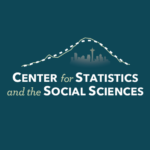Center for Statistics and the Social Sciences *Exciting* Lecture Series
Posted: 12/4/2022 (Demography News)

Please join CSSS for a series of lectures at the cutting edge of statistics and the social sciences. The lecture series started on November 30 and continues through December 5, 6, and 7 from 12:30-1:30pm each day.
*Wednesday, November 30, 12:30-1:30
Ayse Lokmanoglu (Northwestern) (recording)
Title: Unpacking Information Pollution: Computational Critical Methods in examining Digital Communication
Abstract: The rise of social media platforms and digital communication opened new transnational spaces for ‘good’ and ‘bad’ actor communication. My research focuses on the information pollution in social media produced by the ‘bad’ actors, including hate speech, violent extremist communication, dis-/misinformation, and state-sponsored propaganda. In this talk, through three studies, I will present my work answering 1) How do we make sense of meaning embedded in digital content, and 2) How do we understand the relationship of the offline with the digital content? In order to examine global digital content, my work integrates computational text and visual analysis methods with critical theory. Each study looks at different types of content (gendered online forums, tweets and news articles) in multiple languages to illustrate polluted information within ‘banal’ content. In each of the studies, I will demonstrate the computational methods and how I connect the online content on gender and science misinformation to the offline content. Although there are a lot of challenges in examining information pollution in global digital media, I conclude my talk by expanding on future research on new projects developing tools and measurements to minimize the methodological limitations and integrate different types of content such as images. My work has implications for understanding the online strategic communication of “bad actors” and how to mitigate harms while developing computational methods integrating critical cultural theory.
*Monday, December 5 at 12:30pm via Zoom link: https://washington.zoom.us/j/99447824370
Noli Brazil (UC-Davis)
Title: Disparities in Exposure Risk to Environmental Disadvantage in Neighborhood Networks Formed by Urban Mobility Flows
Abstract: A large body of research has been dedicated to understanding the neighborhood conditions that impact health, which outcomes are affected, and how these effects vary by demographic and socioeconomic neighborhood and individual characteristics. This literature has focused mostly on the neighborhoods in which individuals reside, thus failing to recognize that residents across race/ethnicity and class spend a non-trivial amount of their time in neighborhoods far from their residential settings. If residents from poor and minority neighborhoods spend significant time outside of their residential settings and travel to other disadvantaged neighborhoods beyond those that are geographically adjacent, we are underestimating their level of isolation from environments of opportunity and the role of neighborhood conditions in explaining spatial racial inequality. With this project, I use 2018-2019 anonymized mobile phone data to compare racial and socioeconomic inequality in exposure to neighborhood disadvantage in US cities across three scales: the neighborhoods that residents live in, their bordering neighborhoods, and the neighborhoods they visit.
*Tuesday, December 6 at 12:30 pm via zoom: https://washington.zoom.us/j/94075574557
Sasha Shen Johfre (Stanford)
Title: Tools for interrogating inequality in precise and ethical ways
Abstract: Sociologists and other social scientists have a long history of studying the social construction of human difference. Constructs like gender, race, and class are carefully characterized, including their links to processes of inequality. However, it is easy to forget in our daily work that social science researchers are particularly powerful actors in such construction processes, as we help shape the frameworks and truths about the social world that get applied in everyday settings. Given this cultural power, how can social scientists interrogate systems of difference and inequality in ethical and precise ways? In this talk, I describe conceptual and methodological tools I have developed for researchers to be able to conduct more rigorous and socially responsible science about social categories. I then show examples of how I have applied these frameworks in my own work, helping add depth to empirical research on social construction processes. In this and my other research, teaching, and public engagement, I focus on creating tools that help people (both scholars and laypeople) understand, critique, and intentionally engage in social processes.
*Wednesday, December 7, 12:30-1:30 via zoom https://washington.zoom.us/j/97131021824
Austin Kozlowski (U. Chicago)
*Thursday, December 8, 12:30-1:30pm via zoom https://washington.zoom.us/j/96109179342
Emily Gade (Emory)
Location: University of Washington